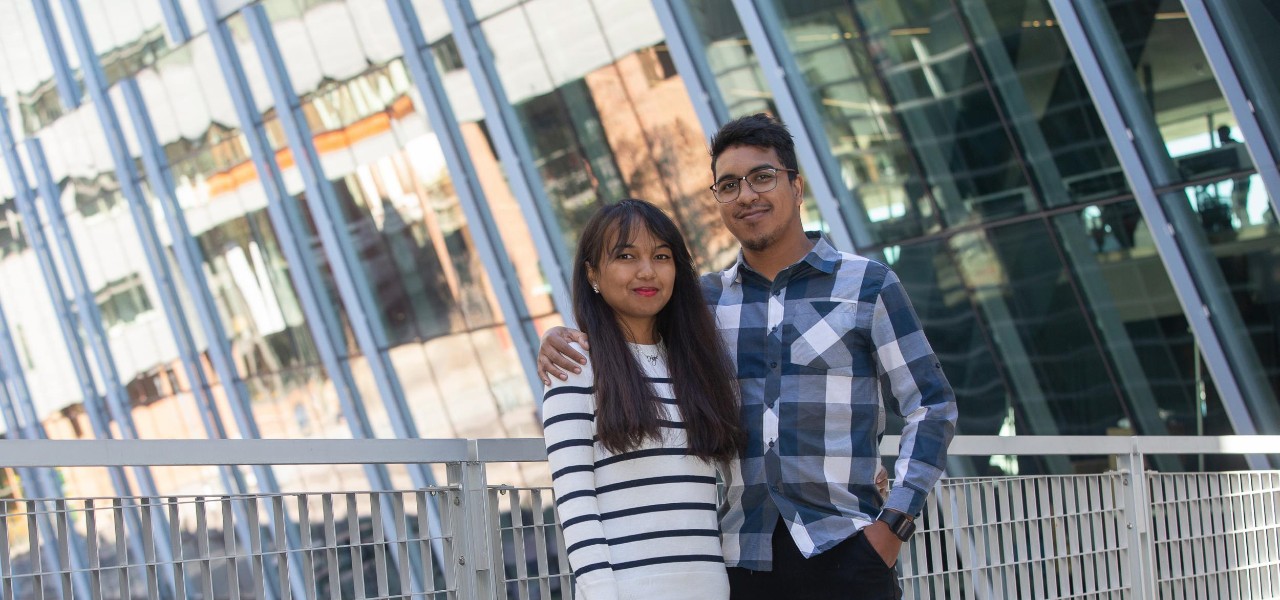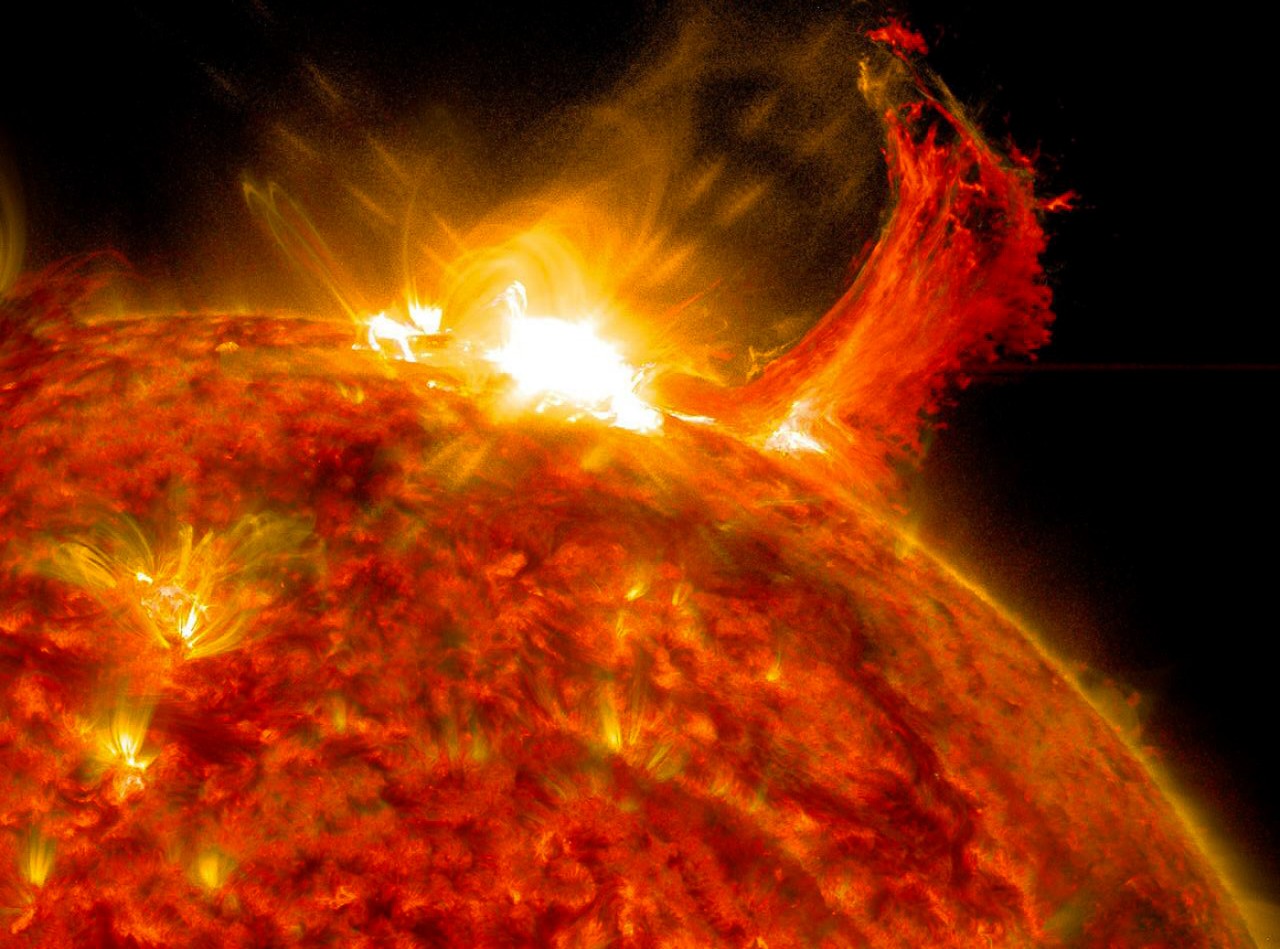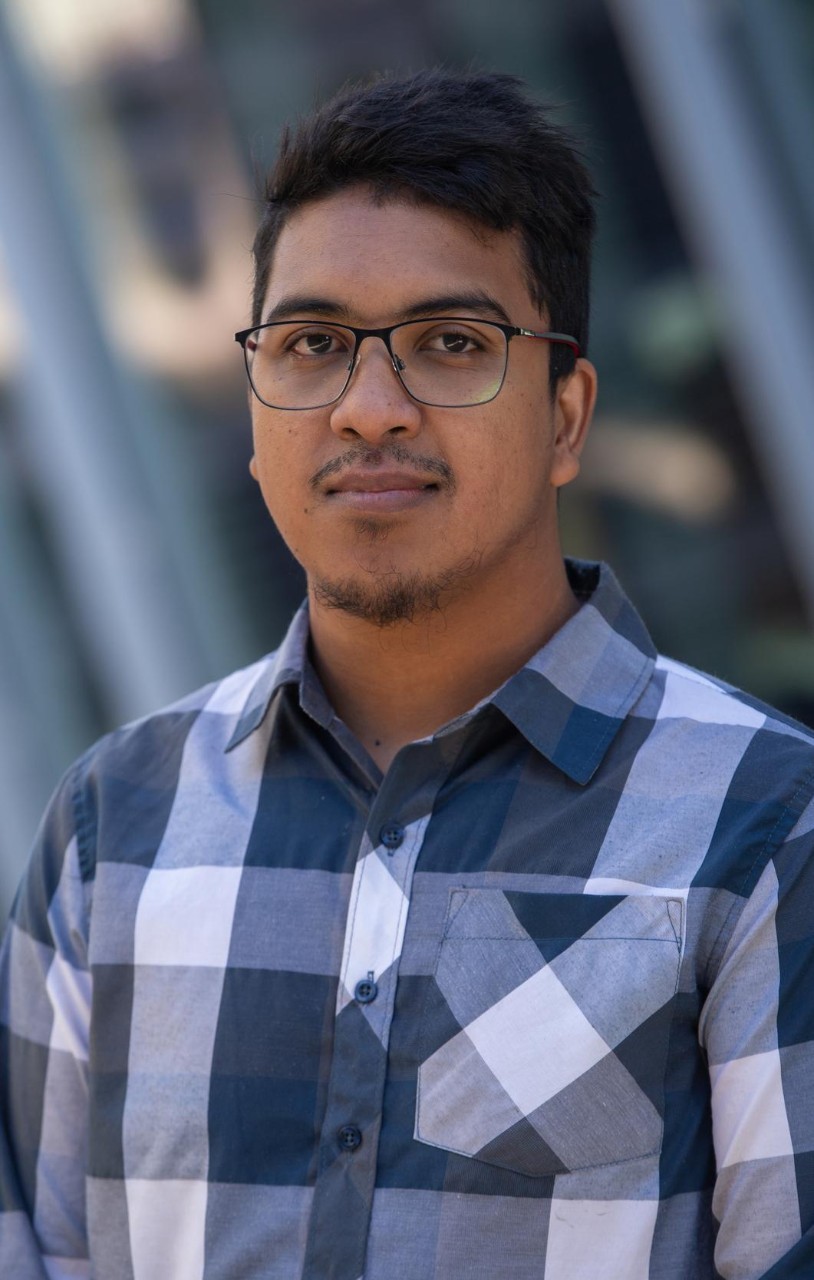
Looking for neutrinos, UC students find love
Doctoral students married while studying physics together in Madagascar
University of Cincinnati doctoral students Miriama Rajaoalisoa and Herilala Razafinime are trying to answer fundamental questions about the origins of the universe in the world’s most sophisticated particle physics laboratories.
Both from Madagascar, they met as undergraduates studying theoretical physics at the University of Antananarivo.
Now married five years, they represent a high-energy physics power couple at the University of Cincinnati.
“We’re not a power couple,” Rajaoalisoa said laughing. “But whenever I get stuck, he helps me.”
“The advantages of being a couple is we are really productive together,” Razafinime said. “If I don’t know how to do something, she does. And if she doesn’t know, then I’ll have some ideas.”

Neutrinos are some of the smallest particles in the universe. Some are generated by the sun's fusion reactions. Photo/NASA Goddard
Rajaoalisoa and Razafinime are graduate research assistants at CERN in Geneva, Switzerland and in Fermilab, Illinois, working on the international collaboration Deep Underground Neutrino Experiment.

Miriama Rajaoalisoa.
“I like the challenge of studying neutrinos because they’re so hard to observe,” he said.
Neutrinos are some of the smallest particles in the universe, so tiny they pass through virtually everything by the trillions every second at nearly the speed of light. They are created by nuclear fusion reactions in the sun, radioactive decay in nuclear reactors or the Earth’s crust or in particle accelerator labs, among other sources. As they travel, they often transition between one of three types or “flavors” of neutrinos and back.
Some physicists believe there is a fourth type called a sterile neutrino. The couple are working with physicists around the world on experiments to identify it. The Deep Underground Neutrino Experiment will help physicists study neutrinos and look for new ones.
“Detecting them is very difficult. That’s why we call them ‘ghost particles,’” Rajaoalisoa said. “If we found a fourth type of neutrino, it would turn the Standard Model of Physics on its head.”
Combined, the two have contributed to more than 50 published studies with their international research partners.

Herilala Razafinime.
While Madagascar isn’t yet well known for its work in high-energy physics, Rajaoalisoa and her husband are hoping to change that. They say their example shows that geography is no obstacle to pursuing your dreams.
“We had a small department of physics in Madagascar,” Razafinime said. “It was just theoretical physics. We didn’t have experimental particle physics. But that’s changing now.”
Madagascar last year hosted the 12th Annual High-Energy Physics International Conference.
“The reason some students in Madagascar aren’t choosing physics is they don’t understand the career paths you can take with a physics degree,” Rajaoalisoa said. “We’d like to show them what you can do with a physics degree.”
Those options span the gamut of top industries along with academia and government research.
Their paths brought them to the physics department in UC’s College of Arts and Sciences.
“UC is a big campus, but the physics department feels quite small,” Rajaoalisoa said. “The professors care about the graduate students. They’re invested in each of our successes. And you really get to understand physics.”
Each year, UC welcomes more than 3,000 students from countries on six continents. Leaving home to study abroad is never easy.
“Home is home. You miss your family. You miss the food,” Razafinime said. “There’s more of a laid-back attitude in Madagascar. There’s a phrase ‘mora mora,’ which means slow down or take it easy. It’s a bit rushed here.”
Rajaoalisoa said students, faculty and staff made sure she felt welcome at UC.
“Student diversity is huge at UC. You’ll never feel like an outsider,” she said.
So what are the odds of two high-energy physicists making a love connection? Since they spent so much time working and studying together, it wasn’t that surprising, they said.
“I felt like she was the kind of girl I was looking for,” Razafinime said. “It was my dream to have someone with the same interests.”
Featured image at top: UC physics students Herilala Razafinime and Miriama Rajaoalisoa work on neutrino experiments together. They have been married for nearly five years. Photos/Andrew Higley/UC Marketing + Brand
Impact Lives Here
The University of Cincinnati is leading public urban universities into a new era of innovation and impact. Our faculty, staff and students are saving lives, changing outcomes and bending the future in our city's direction. Next Lives Here.
Related Stories
Looking for neutrinos, UC students find love
February 14, 2023
University of Cincinnati doctoral students Miriama Rajaoalisoa and Herilala Razafinime represent a high-energy physics power couple at the University of Cincinnati.
UC to receive over $1.5 million from the National Science Foundation
September 14, 2022
UC receives $1.6 million in federal funding from National Science Foundation.
UC Physics hits road to witness solar eclipse
April 9, 2024
UC's Physics Department took students to Blue River Memorial Park in Shelbyville, Indiana, to witness the solar eclipse in the path of totality.
‘Somos familia’
April 26, 2023
“Somos familia” means “we are family,” and students from throughout the Latinx community are building family, finding success and continuing a legacy at UC.
President picks exceptional talent
April 28, 2021
The University of Cincinnati 2021 Presidential Leadership Medal of Excellence Awards honor six undergraduate scholars for scholarship, leadership, character, service and the ideals of the university. Awardees are spotlighted for exceptional academics, creativity, community service and innovation.
Two UC faculty named Fulbright scholars
June 24, 2025
Faculty members in engineering and physics received a Fulbright award that will allow them to pursue their work abroad.
UC hopes to inspire physics teachers with latest discoveries
June 29, 2023
Sponsored by the National Science Foundation and the U.S. Department of Energy, QuarkNet helps high school teachers bring real research experience into their classrooms. A group of Cincinnati-area teachers joined physics faculty in UC’s College of Arts and Sciences in June to learn more about the startling discoveries taking place in labs around the world.
UC, Children’s research collaboration leads to Fulbright in homeland
May 22, 2020
UC international grad student, Dylan David, credits his collaboration with Cincinnati Children's Hospital Med Ctr. for Fulbright grant to homeland in Trinidad.
UC students uncover ancient city
August 10, 2022
The Cincinnati Enquirer highlights research by UC associate professor Steven Ellis and his students who are discovering new insights about ancient civilizations in Italy.
Do you understand cryptoeconomics?
September 19, 2023
Financial literacy is imperative to improving financial decision making and increasing financial empowerment, University of Cincinnati researchers said, and they’ve developed a scale specifically to measure literacy in the cryptoeconomics sector.
